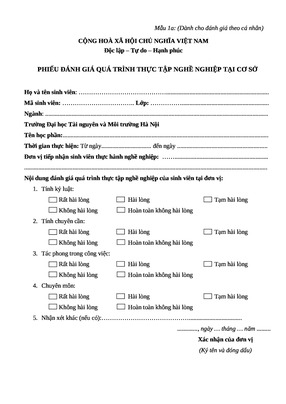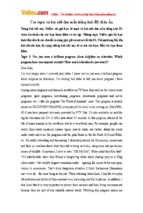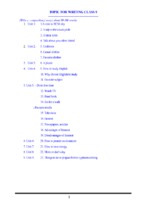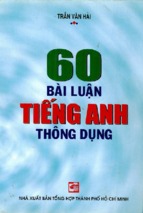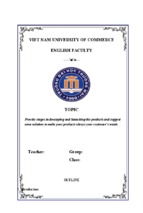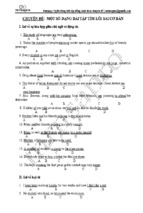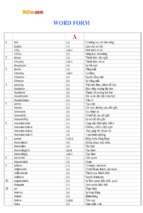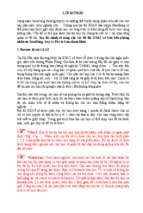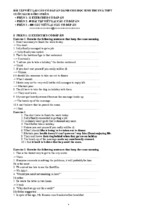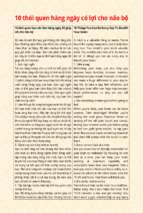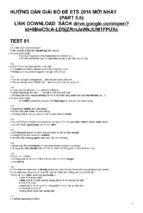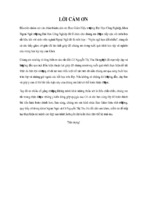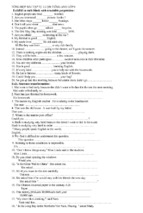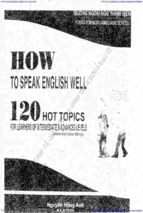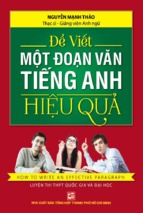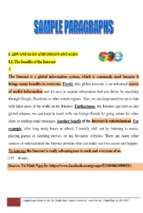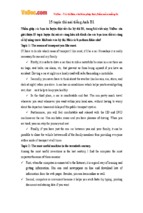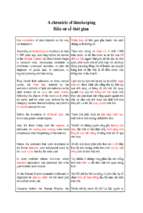Then, there was the crocodile’ with its usual pretence ct innocence. It
refused to be disturbed. Heaven knows how it might have reacted if a
child had fallen into its pit. However, my visit to the zoo had increased
my knowledge of animals.
NEW'WORDS:
2. agility [a'd:3iliti] (n) st nhanh nhen, s lanh Idi
3. beg [beg] (v) x/n¿ c‹fzr xin
4. fascinate [’fzesineit] (v) mé ho c, quye”n ru
5. docile ['dousail] (adj) de blo, de sai khie”n, npoan npoén
6. crocodile ['kmkadail] (adjj cé saw c/té«#/z/, c‹s sa”zr
DAN
Y
Thiim st thti
* Mtr biii: S6 th6 ID rn t n‹›i ly thii de viéng tham
* Thin bar: Tiil di thfim sir thfi ft Johore Bahru nhw thé nilo?
Miéu t:i chung ve so thii:
- Kich thucrc
- Cac loai chim o sci thfi
- C:ic loai thii vii hoat dong cfia chfing: khi, su tfr, ho, c:i sau ci sé
Thu
* Ket lu§n: Di tham sci thil mo r rig kién thiic cfia Hi ve loai vat
-
33. THE IMPORTANCE OF THE NEWSPAPER
The newspaper, today, plays a vital role' in human affairs. Its importance
has not becn diminished' by the appearance of the radio or the television.
Men no longer have travel to get information. The newspaper has
become the main source of information about local and foreign affairs.
Though the radio and television conve important news and messages
quicker than the newspaper, they seldom give the details of an incident.
The newspaper, on the either hand, gives not only more detail about a
particular incident but it also contain.s more new items. This is of great
importance today when political changes occur with a rapidity unknown
before. Besides, the new.spaper is easier to carry and it could be read at
4
any time during the day. Further, the permanence f the printed word
helps one to refresh one's memory of certain facts and incidents reported
in the past.
The importance of the newspaper has been increased grcatly by the
spread of education. Education sharpens one's curiosity about events in
distant lands and also makes one conscious’ of the necessity to maintain
one's rcading habits. In both respects the newspaper appeals most,
especially if one finds little time to read books.
The newspaper should, however, be read with caution, for its capacity
to do harm is great. Most people believe every thing that is reported by
the newspaper. As a result. the newspaper exerts a profound influence on
the minds of its reader. Therefore, when some news is reported wrongly
either by mistake or design, it may cause a lot of harm. On the other
hand, if the policy‘ of the newspaper is to promote the welfare of the
people, it could do a lot of good. For example, it could exercise its
influence to persuade the government of a country to do many things for
the benefit of the people. In a country like Malaysia, where there are
many races of people, the newspaper could also use its influence to
promote good-will and harmony among the people. It is therefore
important to know the policy of the newspaper that one reads.
7
lii general, however, the newspaper tries to report as accu _yrate1 as
possible, for there are various magazines and periodicals’ competing
with the newspaper to provide accurate information on world
developments, and it is the newspaper that links us with the outside
world.
NE;Y W ORDS:
1. vital role ['vaitl rout] (n) r'ai tré thie”t ye“u
2. diminish [di'mini/] (v) piém b’of; thu nho
3. convey [kan’vei] (v) truyén dat, chuye“n tai
4. permanence ['pa:manans] (n) f“nh Iéu déi, flu bén, t“nh v7nh ciJ’u
5. conscious ['kon/as] (adj) co f fhHc, bie“t da'‹;›'c, nh n ra
6. policy [’polasi] (n) d dnp loi hénh donp, chi”nh sdch
7. accurately ['a›kjuritli] (adv) mc›r cach diinp din, chi“nh xéc
8. periodical [,piari'odikl] (n) tap chi’xua“t bin d[nh kf
* Thfin biii:
I. Tain quan trpng ciia b:to chi
1. B:to chi lit nguon thong tin chinh
a. Tin tiic cua b:to chi rat chi tiét
b. Bao chi rfit dé mang theo ngufii
c. Giiip luu trii thong tin
2. B:to chi va gi:to duc
H. B:to chi ne‘n chinh xtic
1. Bao chi sai lam — rat tai hai
2. B:to chi dupe diing cho phiic lpi nguoi d5n
34. THE THINGS THAT I LIKE MOST
There are so many things around us that one finds it hard to have a
special preference for a few particular things. I, however, take a special
interest in motor-car and telcvision.
Motor-cars have always fascinated me. Since my childhood' I have
been travelling in motor-cars, and I have visited hundreds of places in
this country. I have been to remote villages and almost all the towns,
large and small. Travel has broadened' my outlook on life. I have met
various types of people, and my knowledge of the people and places of
this country has increased greatly. If I am at home or if I am walking
along a road, I feel the uri:e’ to travel as soon as I see a car.
It is because of motor-cars that I am able to do various types of work.
In the morning I go to my school, a long distance away, in my father's
car. After school I go to my father's plantation to help him in his work.
Then I visit one of my class-mates and discuss our school work.
Sometimes I visit the cinema, miles away. If there were no motor-cars, I
would not have seen so much. Even in this small country, I would
perhaps not have been able even to attend school.
91
The next thing that I like is television. Television helps us to see and
hear some of the famous leaders of the world. We are also able to see
some of the great events of the day. In addition, we can get news from all
parts or the world, and listen to songs and music. Sometimes there are
special programmes which are very amusing. The television programmes
become more interesting on a rainy day. We can then sit in the comfort
of our home and watch the television programme. Even if we cannot read
the newspaper for some reason, television keeps us well informed about
the latest developments in the world. In this respect, television is better
than the radio because the pictures and incidents shown on television
convey a better impression than only the spoken words of the radio.
I shall therefore always have a special preference for the motor-car
and television.
NEW WORDS:
1. childhood ['t{aildhud] (n) rzr‹›/ thd a”u, thdi thd a”u
2. broaden ['bro:dn] (v) md rc›np
Nhii:rig th md toi thtch nh“at
* Mtr bai: Xe hen v vfi tuyén truyén hinh
* Thin b I:
1. Tann quan trpng ciia xe hen
2. Tann quan tr rig ciia truyén hinh
35. MY HOBBY
To have a hobby is to know how to spend one's leisure moments. A
hobby, besides providing an avenue f escape from boredom, can also
add to one's knowledge of human affairs. My hobby is reading.
When my day's work is over, I sit down in the privacy' of my room
and read the newspaper. Reading the newspaper is like travelling round
the world. As I read about the developments in the various parts of the
world, I fell that I am there myself observing the incidents. I also feel
92
that I am having contacts with many leaders and peoples of the world.
This feeling is a source of pleasure to me. By reading the newspaper I
have acquired a better knowledge of the world. I am aware of what
scientists, economist.s and politicians are doing to make this world a better
place to live in. At the same time, I am also aware of the activities of those
who are trying to create chaos’ in the world.
After reading the newspaper, I take a book which requires deep
concentration‘, such as a history book or a book on Psychology.
Sometimes I read a novel or a popular magazine. Through this hobby I
have learned that people every where are the same, in all ages, and in all
countries. I have also learned that the world was made not for man alone
but for every creature that can feel hunger and thirst, warm and cold. It
has lllso helped me to see not only into the most remote regions of the
world today but also into the world in which our ancestors’ lived.
My hobby has deepened and widened my knowledge of man and his
place in the universe‘. Reading, I think, has made men more human,
broad-minded and sympathetic. It has brought me into contact with
many great minds, and acquainted’ with the beauty of language and
ideas. It has also improved my powers of expression. I have little
difficulty in expressing my thoughts and feelings.
Therefore, I could say that my hobby has made me a better person.
NEW WORDS:
6. universe [’ju:niva: s] (n) F'z/ frzr
7. acquaint [a’kweint] (v) thin quen
SP the::h céa Hi
* Thu tiéu khién cfia tot lit:
- Dpc b:to chf
- Dpc s:ich
* Ich l pi ciia cfia vi(c d9c s6ch biro
36. THE ADVANTAGES AND DISADVANTAGES
OF THE CINEMA
Cinemas are a common sight nowadays. They are found in every town.
The existence of so many cinemas reflects their popularity. They have
indeed become the most popular places of entertainment'.
The cinema attracts large numbers of people everyday. It is the
inal:net' of the town. It sometimes attracts even those who do not wish to
see a film.
As it is so popular, the cinema exerts a profound’ influence on the
minds of many people, young and old. The influence is sometimes good,
and sometimes it is bad. Films showing criminal activities and the
sensual’ desires of man have caused much harm to many youths. Some
youths have become criminals themselves though almost every film
shows how the good always triumphs’ over the evil. The cinema has also
caused many people to waste money. Such people have become so
6
addicted to visiting the cinema that they see almost every film, good or
bad. In this way money is wasted not only on purchasinii 7 ickets for
admittance to the cinema but also on travelling and many other things.
one», however, the cinema helps to spread knowledge. There are
many films which show the activities of the various races of people
living in the remote regions of the earth. Some films show how man has
struggled through the centuries to make the world a better place to live
in. There are also films which show the events that led to some of the
8
important battles in the past. They are shown with so much realism that
one remembers them for a long time. Such films are indeed invaluable,
especially to those who are illiterate. In this respect the cinema could be
regarded as a school. Even the dullest student learns many things if he
sees an educational tilrn in the cinema. though he may learn nothing
from his teacher or his books. Such is the cffect of the film, and in many
countries, educational authorities are trying to make the best u.se of the
cinema to spread knowledge and information.
It is therefore clear that thc cinema has many advantages as well as
disadvantages. Often the advantages out weii:h" the disadvantagcs. Those
who visit the cinema with the purpose of learning something good are
sure to benefit from almost every visit to the cinema.
NEW WORDS:
1. entertainment [,enta’teinmant] (n) Zre'zz khié’n, piéi In“
2. magnet ['mzegnit] (n) nam chim
3. profound [pro'faund] (adj) sau UC, Aau rc›f7§(
4. sensual ['sen/ual] (adj) (thuoc) xdc th]t; nhqc dqc
5. triumph [’traiamf] (v) chie”n thénp,; thénp !i;/i
6. addicted [a'diktid] (adj) say mé, np/zzén
7. purchase ['pa:t/as] (v) mz/a, s‹3m
8. realism [’rializm] (n) c/›zJ np7›?a /z/én thirc
DAN Y
U’u diém vé khuyet iliém eta phim Huh
* Khuyet diém
- Phim kfch dong toi pham va ucrc muon kho:ii lac ciia thanh nifin
- Ngircri ta tieu phi tién vao phim :inh
* Ibn diem
Truyén b:i kién thiic
37. THE IMPORTANCE OF EXAMINATIONS
Life today has become so complex' that examinations have come to
play an important part in one's educational career. Examinations are
considered so important that most students are afraid of them.
The ability to pass an examination is indeed a valuable quality. It
shows thai the student is able to express his thought and ideas to a
manner others can understand. It also shows that the student has
acquired' a ‹certain amount of knowledge in some branches of study.
Bcsidcs, thc mind of a student. even if he i.s dull, receives good exercise
when hc prcparcs for an examinati‹in. A student's success in an
95
examination, therefore, helps employers and others to assess" his mental
or general ability.
Some people, however, arcue4 hat examinations test only a certain
kind of skill. They say thai many people have a good memory and a
special ability to pass examinations and achieve’ brilliant results, though
they have no capacity for original thought or imagination. But it should
be realised that today the syllabuses‘ are so extensive that a student
cannot expect to pass an examination by relying entirely’ on his
memory. The student of today must not only have a fair knowledge of
the subject matter but also be able to show his intelligence and power of
reasoning, especially if he is sitting for a higher examination. Therefore,
a student’s ability to pass an examination must indicate some of his
mental powers as well as his erasp’ of the subjects that he has studied.
If there were no examinations, most scholars’ would
0 have been less
informed than they are today. Examinations com l' students to read
as
much as they can, and as they do so, they absorb knowledge
unconsciously' '. Further, because of examinations; teachers have to
confine themselves to the syllabuses which are aimed at im artin "
knowledge in a systematic" manner, and thus develop mental discipline.
Examinations are therefore an important part of academic studies.
NEW WORDS:
1. complex ['kompleks] (adj) phic tap, rac ro”i
2. acquire [a'kwaia] (v) r7zzr d’zrj;rc,zfar d’zrp'c
3. assess [a’ses] (v) ‹:fén7› p/é,- irdc d[nh
4. argue ['o:gju:] (v) bfen tu n, tranh Iu n
5. .achieve [a’t/i:v] (v) d t dirpc, piénh dir‹;/c
6. syllabus [’silabas] (n) chu’dng trinh hoc:, de cirdnp bai pianp
7. entirely [in'taiali] (adv) hoén tain
8. grasp [gra:sp] (n) st mm d’zroa, sir hieu tha“u
9. scholar ['skola] (n) hoc pit
\0. compel [kam’pel] (v) buc›c phéi, bét buac, thiic ép
1 1. unconsciously [,»n'konfasli] (adv) Ichonp tfipidc,
f dfnh, khonp co f th‹rc
12. impart”[im'pa: t] (v) rrzzyén d’‹zf, I‹é’cho hay, p/zo 6/ér›
13. systematic [,sista'mzetik] (adj) re› p/›cro'r›p p/z‹zp
96
DAN Y
Tim quan trpng ctia céc kf thi
— Gi:i tri ciia thi cfi: gifip thi sinh tu chfrng to minh
- Thi cfr ngay nay: de thanh cong khfing chi can co kha uang ghi nhcr
mfi cii kha uang suy Iuan.
- Thi cir vcri ciic hpc gi:i: giilp trau df›i kién thuc mot c:ich cd h( thong
38. A WEEK IN HOSPITAL
I had always dreaded' the thought of being admitted to hospital. The
peculiar' smell of the hospital, the sight of deformed and criticall '
ill persons and dead bodies in the hospital are things that I had
always wished to avoid. But a serious illness sometime ago
necessitated‘ my admission to the General Hospital in Malacca.
Though I was seriously ill and required special attention, yet the
knowledge that I was in the hospital made me feel miserable dui ing the
first few days. The clothes that I had to wear in the ho.spir al ii’‹'ic
uncomfortable and the food was tasteless'. At night, when all the J›ai ir t
it.s
were asleep, I used to wake up and think of what rni_'ht JiapJicn il I lie
dead bodies in the mortuar 6 near by came back to life. I alsri thc›iipht of
the patients who might die at anytime. Sometimes I thought that I myself
might not wake up from my sleep; that I miuht huvc to lcave my dear
parents, brothers and sisters and never i‘etiii ii. Team would then flow
from my eyes.
From the fourth day, however, mv spirits were high. The doctors and
nurses assured’ me that I woul‹l i’ecover completely in a few days and
that I could move about in the hospital as I wished.
I now began to think of the good work that was being done in the
hospital to reduce pain and suffering. Hundreds of sick people were
coming to the hospital, many with serious injuries caused by various
kinds of accidents, with the last hope of survival. And while many were
dying, many more were returning home with smiles on their faces.
Working every minute and sacrificing‘ their ‹›wn pleasures and pastimes,
the doctors, nurses, hospital assistants and all the other staffs were doing
their utmost to save another life. Their humanity impressed me deeply. I
now realised w fiat an iiiipoitant i’ole the hospitals wci‘e playing in our
daily lits, and the disgust" that I HH on the Iii’st lcw days was u‹ine.
u in tthhcc
for’ a week, I retui‘nc‹1 home with a better
hospital
know1e‹1‹ c ct human mi,sei-y an‹1 saci i fice.
NEW WORDS:
1.
2.
3.
4.
dread [dred] (v) k:inh h©i, I‹i”nh ed
peculiar [pi’kju: lja] (adj) la k fi, riéng biet
critically ['kritikali] (adv) r/g‹vy /‹/Cl›, fra/z› trqng
necessitate [ni'sesiteit] dar pAé/, d¿›i hcii phéi, cin ph‹ai co
5. tasteless ['teistlis] (adj)
. .
DAN Y
- Lcri fch c ua
b‹:nh
’n — sir h sinh
nhéo
39. A FRIGHTENING EXPERIENCE
rrai qua in‹›t nai kinh hoang
I am nut one who i s fi’iqhtencd' easily; but I must admit that one night I
saw a figure that struct: tei‘ror into my heart.
It was a m‹i‹iii-l it ni p•ht'. I was i-stunning 1i‹›me on foot front a
town a few writes away. Th ut was the first night in my life that I was out
alone. Thc rG‹1 l11Of1 tVhiCh I Wits '- . ” '• z was not used much at night.
Even cluring the ‹lay, ii was u• -'› :.› iiy 6) i!i‹ sc who worked in the
rubber and banana pl ant:iti tI . iC›n u that matt. As I was walking, I
c‹iuld hear the lltJ lSfiS 1li•'²• ".' ׺1*'irrels, i nsec t• oi1d owls. Creatures
that love the ni pht
v ‹›i Id s• .n us h:'ts .'. . e very active, and ther e weie hundreds of
98
- Xem thêm -

